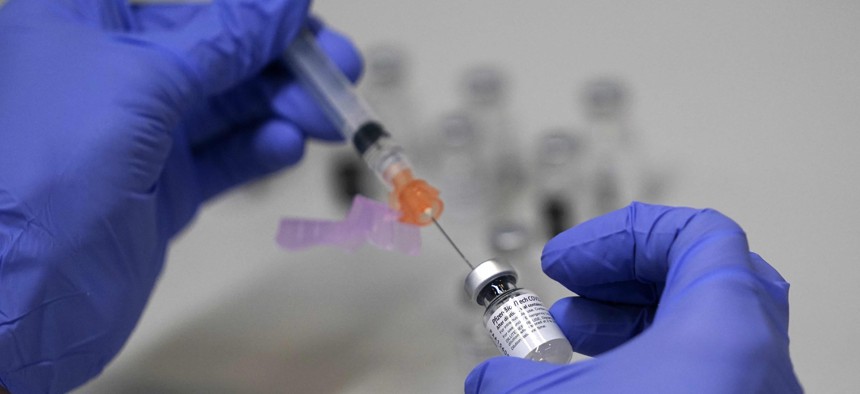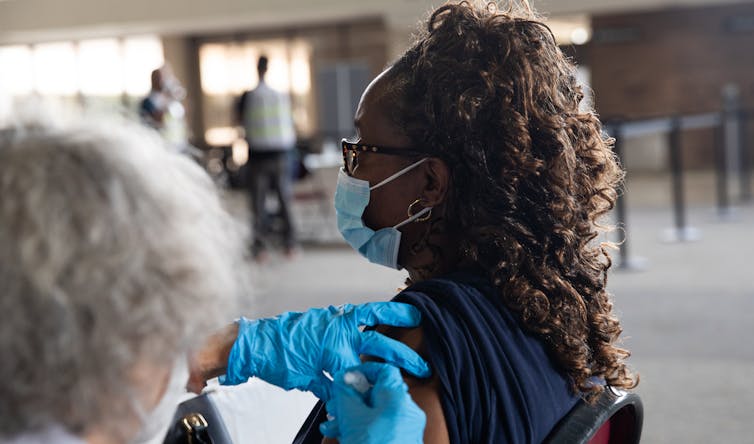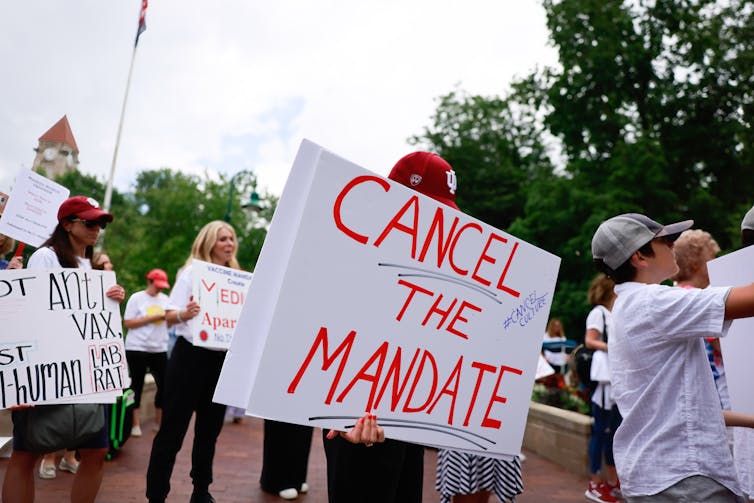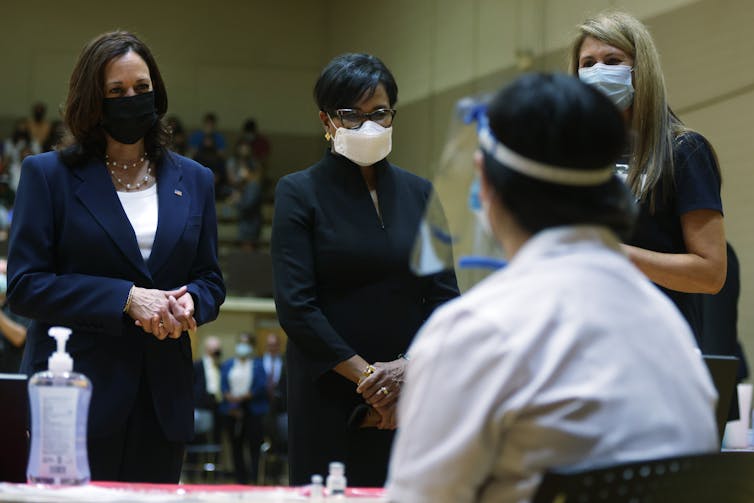How Public Health Partnerships are Encouraging Covid-19 Vaccination in Mississippi, Michigan, Indiana and South Carolina

A pharmacy technician loads a syringe with Pfizer's COVID-19 vaccine, Tuesday, March 2, 2021, at a mass vaccination site at the Portland Expo in Portland, Maine. AP Photo/Robert F. Bukaty
Four public health and communications experts explain how they are teaming up with nonprofits and other partners to encourage more people in their states and local communities to get the shots.
About 18 months into the coronavirus pandemic, roughly 61% of all Americans have gotten at least one dose of a COVID-19 vaccine. In some states, however, the share of vaccinated people is as low as 43.6%. There are many counties where numbers are even lower than that, leaving them especially vulnerable to surges in coronavirus infections, hospitalizations and deaths. Here, four public health and communications experts from Michigan, Indiana, Mississippi and South Carolina explain how they are teaming up with nonprofits and other partners to encourage more people in their states and local communities to get these potentially lifesaving shots.
1. Closing the racial gap in Michigan’s COVID-19 vaccination
Debra Furr-Holden, professor of public health, Michigan State University
Initially, Michigan was one of many states with tremendous racial disparities in COVID-19 cases and deaths. As a result, the state tried to make it easier for Blacks and other people of color to get tested, acquire personal protective equipment and, once vaccines became available, get vaccines.
But as an epidemiologist who participated in the partnerships formed between the government, academics, health care professionals, nonprofits and philanthropic funders, I’m concerned because African Americans are still disproportionately getting COVID-19 and dying from it. And despite our concerted efforts, I’m troubled by the big gap between vaccination rates for Black people and white people in Michigan, even if these differences by race and ethnicity are dissipating across the country overall.
About 13% of Michigan residents are Black, and yet 10% of the people in the state who had gotten at least one dose of a vaccine by Aug. 16, 2021 were Black, according to the Kaiser Foundation.
This imbalance is one reason why I helped launch the National Network to Innovate for COVID-19 and Adult Vaccine Equity, funded with a $6 million grant from the Centers for Disease Control and Prevention. One overarching goal of this project is to close the racial disparities gap in COVID-19 and other adult vaccinations, such as the flu and shingles.
The project is a partnership between Michigan State University, Michigan Public Health Institute, the Community Foundation of Greater Flint and Community Campus Partnerships for Health. It also partners with organizations committed to reducing African American health disparities, including the NAACP, the Rainbow PUSH Coalition and the National Medical Association.

2. Outreach to Latinos and members of the Haitian community in Indiana
Omolola Adeoye-Olatunde, assistant professor of pharmacy practice, Purdue University
Marion County, which includes Indianapolis, is racially and ethnically diverse, with nearly half the population identifying as people of color. Even before the COVID-19 pandemic, it had Indiana’s highest level of food insecurity. As of mid-August, Black and Latino residents were underrepresented among people in Indiana who had gotten at least one COVID-19 vaccine dose. Roughly half of all people in Marion County had gotten at least one dose by late August 2021.
The Purdue University Center for Health Equity and Innovation, or CHEqI, where I work, partnered with the Gleaners Food Bank of Indiana and Walgreens to design and pilot an initiative that gave COVID-19 vaccines to people arriving for drive-thru food distribution.
Across the pilot’s first six vaccination events occurring between June and August 2021, 2,787 families got food and 2,465 of the food bank’s clients were asked about their vaccination status and interest by student pharmacists. About 60% said they’d already been vaccinated; 229 of them got vaccines by Walgreens pharmacy staff, with 14% being second-dose vaccinations.
Nearly 60% of the people who got the pilot’s vaccines and reported their ethnicity self-identified as Hispanic or Latino.
Numbers of vaccinations have declined since the first events in June, but student volunteers and Walgreens staff have observed that several clients who received vaccines were previously reluctant to get them. For example, one food bank client indicated they had recently canceled a scheduled vaccine appointment due to hesitancy. Upon talking to student pharmacists and Walgreens pharmacy staff for 10 minutes, and having all of their concerns addressed, they decided to get the vaccine at a Gleaners vaccine event.
We will expand this model to another central Indiana location in late August 2021. There, we should be able to serve not just more Latinos, but many members of the Haitian immigrant community and other food-insecure people. Later, we plan to try integrating access to donated food with other public health initiatives.
I believe that this collaborative model, built on longstanding trust between Gleaners and its clients, serves as a promising avenue to simultaneously address food insecurity, decrease vaccine hesitancy, increase access to COVID-19 vaccines and promote health equity in central Indiana.

3. Navigating the Mississippi RIVER
David Buys, associate professor of health, Mississippi State University
By Aug. 24, 2021, 44.8% of Mississippi residents had gotten at least one shot of the COVID-19 vaccine. With one of the country’s lowest vaccination rates, my state’s latest outbreak is filling up hospitals.
Mississippi State University is trying to increase the vaccination rate by partnering with the Delta Health Alliance, a public health nonprofit that serves communities in Mississippi and western Tennessee. Together, we are spreading awareness about the importance and safety of getting vaccinated on campus and in all 82 of the state’s counties, especially 32 counties in eastern Mississippi.
The new Mississippi RIVER project – RIVER stands for Recognizing Important Vaccine and Education Resources – includes more than 20 students and others who are paid vaccination ambassadors. During the 2021-2022 school year, they are educating their classmates, answering frequently asked questions and encouraging their peers to visit pop-up clinics.
This partnership is funded by the Health Resources and Services Administration, a federal agency. In turn, it is funding incentives for Mississippi State students to get their shots, such as $250 in bookstore coupons or a chance to win a $9,000 tuition discount through a raffle.
Additionally, through this partnership, my university’s extension service, where I do most of my work for the state, is leveraging our reach across Mississippi, including through one-on-one conversations with community members at local workplaces, festivals and other events.

4. Identifying barriers through focus groups in South Carolina
Brooke W. McKeever, associate professor of communication, University of South Carolina
Toward the end of August 2021, South Carolina ranked 41st in the U.S. in terms of the percentage of the population that had been fully vaccinated. According to state health authorities, 60.5% of all adults had gotten at least one COVID-19 vaccine dose by Aug. 20 but there are counties with much lower vaccination rates.
Researchers at the Prevention Research Center at the University of South Carolina are working with the South Carolina Community Health Worker Association, Palmetto AIDS Life Support Services and others to increase COVID-19 vaccination throughout the state.

Together, we are working to learn what barriers still exist, what misinformation may be spreading in various communities, how we can increase trust and convince those who have not been vaccinated to get their shots amid an alarming outbreak.
Based on what we learn through focus groups, we will work with community health workers to address misinformation and communicate with those who still have concerns that are keeping them from getting vaccinated. If there are other barriers, such as access to vaccines, we will address those, too.
We are building on a wide array of partnerships – with churches, nonprofits, a community advisory board and academic researchers – to gain access to trusted individuals who can serve as important sources of health information in communities that might be difficult to reach otherwise.
Our Prevention Research Center is one of many throughout the U.S. that have been funded by the Centers for Disease Control and Prevention as part of its COVID-19 Vaccinate with Confidence Strategy program. We hope our work with the CDC, state agencies and local nonprofits will get more South Carolina residents vaccinated, which will help protect us all moving forward.
[Research into coronavirus and other news from science Subscribe to The Conversation’s new science newsletter.]
![]()
This article is republished from The Conversation under a Creative Commons license. Read the original article.
Debra Furr-Holden, associate dean for public health integration, Michigan State University; Brooke W. McKeever, associate professor of communication, University of South Carolina; David R. Buys, associate professor of health, Mississippi State University, and Omolola Adeoye-Olatunde, assistant professor of pharmacy practice, Purdue University.
NEXT STORY: Supreme Court Ruling Allows Evictions to Resume





